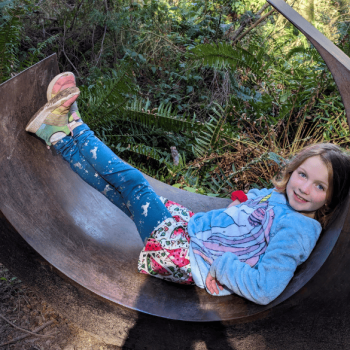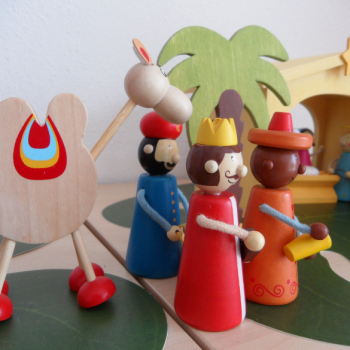
Questions are a powerful tool in a Christian parent’s toolbelt. If we can learn to ask great questions that our children want to answer, we can grow wisdom, identity, and connection in our children. Asking kids questions to help them grow in their faith doesn’t always come naturally to parents, but you can learn to do it.
(This may contain some affiliate links, which means I receive a small commission, at no extra cost to you, if you make a purchase using these links. For more information, please see my disclosure policy.)
Series Helping Your Kids Own Their Faith
This is week 5 of a series on equipping you to help your child to own their faith. We have already talked about:
- The Jesus Kids Want to Know
- The Benefits of Choice
- Play to Help Your Child Grow Spiritually
- Telling Engaging Bible Stories
Let’s talk about how asking kids questions can help them to own their faith by giving them value and a voice.
The Goal of Asking Questions as a Christian Parent
“Purposeful questions are the best and easiest tool we have as parents to invest in the lives of our kids.” Sarah Anderson in “The Power of A Question”
The goal of asking questions as a Christian parent isn’t to test our children’s knowledge but to communicate curiosity, honor their voice, build wisdom, and guide them to think, wonder, and reflect.
Jesus asked 307 questions that are recorded in the gospels. How many do you think were not recorded?
How do you feel when someone asks you curious questions versus when they bombard you with accusatory questions?
We want our questions to encourage conversation and connection while communicating with our child that their voice matters to us and we enjoy spending time with them.
When to Ask Questions
Asking kids questions can be helpful in a variety of circumstances. Let’s look particularly at asking kids questions for connection, questions for discipleship, and questions for discipline.
Ask Kids Questions for Connection
“A good first question says, ‘I’m interested.’
Active listening says, ‘I care.’
An intentional second question says, ‘You matter.’”
Sarah Anderson in “The Power of A Question”
We are created in the image of a relational God. We are created for connection. Our children need that and as parents, we set the stage for healthy connection for a lifetime.
One of the top five things parents can do to help their children grow into a faith that lasts is to see and delight in them for who God created them to be. For optimal development, children need to feel seen, known, and loved. Good questions can help us achieve that for our children–and for us!
Also, great connections with our children are the foundation for discipline and discipleship. The way we choose to connect with our kids reflects to our children how they see God wanting to connect with them. And, children more naturally want to please those who they feel loved and connected to.
Ask Kids Questions for Discipleship
“Often children are closer to the truth than we are and can teach us with their keen insights. Be willing to reverse the roles and be the learner.” Peggy Joy Jenkins in Nurturing Spirituality in Children: Simple Hands-On Activities
When we use intentional questions in nurturing our children’s faith, we show them that their thoughts, ideas, and voice matters. It models that questions are an honest and humble response to God and his Word.
We can use questions to help our child to reflect on what they have heard in a story, to process their understanding, and to scaffold their analysis of what this means about God and for them.
We want to keep questions light-hearted and is often helpful to ask more open-ended questions than ones that have a right or wrong answer. Questions with right and wrong answers can feel intimidating and a wrong answer can shut down a child from wanting to engage with further questions.
Wondering and what-if questions are particularly helpful around Bible stories. You mayalso want to break the ice with questions of your own or silly questions such as “Do you think the disciples had stinky feet?”
If you want to dig deeper into this topic, I recommend this mini-course: Playfully Faithful Questions.
Ask Kids Questions for Discipline
“Using curious questions helps us let go of the drive to manage behavior and fix the immediate problem. Instead, we focus on a long-term view as we mentor our child’s growing wisdom.” Chad Hayenga in the Connected Families’ The Power of Questions Course.
I love the practice of asking kids questions for discipline. Connected Families does a fantastic job of using this throughout their framework.
They emphasize that to benefit most from questions, parents need to ask from a place of curiosity and not accusation. The question “What’s going on in here?” could invite conversation and problem-solving when asked with true curiosity and calmness, or it could send a child into defensiveness and fight-or-flight. The tone is important with questions, as it is with all communication.
If you want to dig deeper into this topic, I recommend Connected Families’ The Power of Questions Course.
Asking Children to Ask Questions
Have you ever had a theological conversation or read the Bible together with your kids, and it was a BIG topic where you expected your kids to have questions, but instead you got radio silence? No questions? You just shared about the concept of the Trinity and they have no questions? How can that be?
Here are two possible ways to handle the situation:
Come Back to Asking Questions Later
“Studies show that children have greater retention when tasks are left incomplete. So it’s better to cut the lessons short, letting them want a little more than to exhaust the subject and bore them.” Peggy Joy Jenkins in Nurturing Spirituality in Children: Simple Hands-On Activities
If your kids are shutting down, it may mean they are done. Forcing answers and conversation could steal, kill, or destroy their joy in having faith-based conversations with you or anyone.
Come back to questions later or throughout your week. You might say something in the car the next day like, “I was thinking about that Bible story we read last night. I wonder what it might have felt like to be thrown up on the beach by a big fish. Is there anything you are wondering about?”
Model Asking Questions and Wondering
“When we have questions about God, they draw us closer to God.” Playfully Faithful Questions.
The best way over time to help our children to feel comfortable asking questions about God and the Bible is by modeling asking questions ourselves. If we as parents feel like we always have to have the answers to theological questions we are modeling pride to our children.
Sharing your own wondering and questions helps children to feel safe to have and voice their questions, too.
Final Thoughts on Asking Kids Questions
Questions hold a world of potential if used thoughtfully and curiously. We can empower our children to speak boldly, wonder well, and know that they are valued and delighted in by asking kids questions and listening to their answers.














